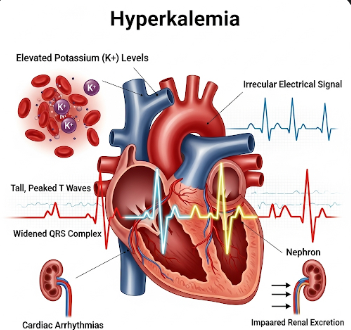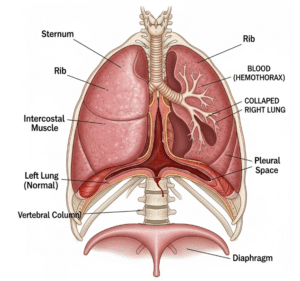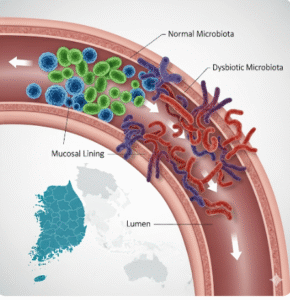Overview
High potassium, medically termed hyperkalemia, is a condition in which the potassium levels in the blood are elevated above normal ranges. Potassium is an essential mineral that plays a vital role in nerve function, muscle contraction, and heart rhythm regulation. Excessive potassium can lead to serious complications, especially affecting the heart.
In South Korea, hospitals and specialized clinics provide comprehensive evaluation, advanced testing, and effective treatment for hyperkalemia, ensuring patient safety and stabilization of electrolyte balance.
Key Facts
🟢 ➤ Normal blood potassium levels range from 3.5 to 5.0 mEq/L; levels above 5.0 mEq/L indicate hyperkalemia.
🟢 ➤ Hyperkalemia can be mild, moderate, or severe, with the risk of life-threatening heart arrhythmias in severe cases.
🟢 ➤ Common causes include kidney disease, certain medications, excessive potassium intake, and metabolic disorders.
🟢 ➤ Symptoms may be subtle or absent in mild cases but can include muscle weakness, fatigue, and cardiac irregularities.
🟢 ➤ Diagnosis requires blood tests, ECG, and evaluation of kidney function.
🟢 ➤ Treatment involves managing the underlying cause, lowering potassium levels, and monitoring heart function.
What is Hyperkalemia?
Hyperkalemia is a potentially serious electrolyte imbalance in which the blood contains too much potassium. Potassium is essential for:
➤ Maintaining normal electrical activity of the heart and muscles.
➤ Regulating nerve impulses and muscle contractions.
➤ Supporting fluid and acid-base balance in the body.
Excess potassium can disrupt cardiac conduction, leading to arrhythmias, and may cause muscle weakness or paralysis if untreated. Hyperkalemia is often detected during routine blood tests but can develop rapidly in certain medical conditions.
Symptoms Related to Hyperkalemia
Symptoms vary depending on the level and speed of potassium increase:
🟢 ➤ Mild hyperkalemia may be asymptomatic.
🟢 ➤ Muscle weakness or fatigue.
🟢 ➤ Tingling, numbness, or a “pins and needles” sensation in extremities.
🟢 ➤ Palpitations or irregular heartbeats.
🟢 ➤ Chest discomfort or shortness of breath in severe cases.
🟢 ➤ Nausea or gastrointestinal upset.
🟢 ➤ Severe hyperkalemia can lead to life-threatening cardiac arrest.
Causes / Possible Causes
Hyperkalemia can result from increased intake, decreased excretion, or redistribution of potassium:
Kidney-Related Causes
➤ Chronic kidney disease or acute kidney injury reducing potassium excretion.
➤ Dehydration or reduced urine output.
Medications
➤ ACE inhibitors, ARBs, potassium-sparing diuretics, NSAIDs, and certain antibiotics.
Metabolic and Hormonal Causes
➤ Addison’s disease or adrenal insufficiency.
➤ Acidosis causing potassium to shift from cells into the bloodstream.
Increased Intake
➤ Excessive dietary potassium or supplements.
➤ Rapid potassium infusion in medical settings.
Cellular Redistribution
➤ Tissue breakdown from burns, trauma, or hemolysis.
➤ Insulin deficiency or uncontrolled diabetes leading to intracellular potassium release.
Other Causes
➤ Blood transfusions or rhabdomyolysis (muscle breakdown).
➤ Pseudohyperkalemia: false elevation due to blood sample handling.
When Should I See a Doctor?
Immediate medical attention is required if:
🟢 ➤ You experience palpitations, chest pain, or shortness of breath.
🟢 ➤ Muscle weakness or paralysis occurs suddenly.
🟢 ➤ You have known kidney disease or are taking potassium-elevating medications.
🟢 ➤ Blood tests indicate elevated potassium levels (>5.0 mEq/L).
Prompt evaluation helps prevent cardiac complications and stabilize potassium levels safely.
Care and Treatment
Management focuses on reducing potassium levels, treating underlying causes, and monitoring heart function:
Lifestyle and Dietary Measures
➤ Limit high-potassium foods (bananas, oranges, tomatoes, potatoes) if advised by a doctor.
➤ Ensure proper hydration to support kidney function.
➤ Monitor potassium intake from supplements and medications.
Medical Treatments
➤ Medications such as calcium gluconate to stabilize the heart.
➤ Insulin and glucose therapy to shift potassium into cells.
➤ Diuretics to promote potassium excretion.
➤ Sodium polystyrene sulfonate to remove potassium through the intestines.
Advanced or Emergency Interventions
➤ Hemodialysis for severe hyperkalemia, especially in kidney failure.
➤ Continuous cardiac monitoring for arrhythmia risk.
➤ Correction of underlying conditions like acidosis or adrenal insufficiency.
Advanced Care in Korea
➤ South Korean hospitals provide state-of-the-art laboratories, continuous cardiac monitoring, and emergency dialysis.
➤ Multidisciplinary teams ensure rapid diagnosis, electrolyte stabilization, and tailored long-term management.
➤ Patient education emphasizes dietary guidance, medication adherence, and regular monitoring to prevent recurrence.
Highlights (Clean Green Arrow Version)
🟢 ➤ Hyperkalemia is a condition of elevated blood potassium levels, which can affect heart and muscle function.
🟢 ➤ Symptoms: muscle weakness, fatigue, tingling, palpitations, nausea, and in severe cases, cardiac arrest.
🟢 ➤ Causes: kidney disease, medications, metabolic disorders, high potassium intake, and cellular breakdown.
🟢 ➤ Seek urgent medical care if experiencing palpitations, chest pain, severe weakness, or confirmed high potassium levels.
🟢 ➤ Treatments include dietary adjustments, medications, insulin therapy, diuretics, and hemodialysis for severe cases.
🟢 ➤ South Korea provides advanced hospital care with rapid diagnosis, cardiac monitoring, emergency interventions, and long-term management for hyperkalemia.













